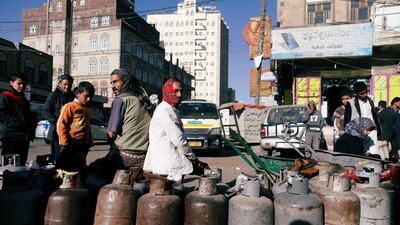The world’s largest humanitarian crisis in Yemen is entering its seventh year, with the human and economic costs of the continuing conflict and the Covid-19 pandemic crippling our country.
Access to reliable electricity is just one of many necessities people in Yemen are living without.
World Bank assessments show no public electricity is available in a handful of our cities, and almost none in our largest city Sanaa, home to two million people.
What international headlines have missed, however, is the story of how sheer necessity and ingenuity have given rise to a local solar power industry.
While Yemen’s conflict raged, businesses started importing solar photovoltaic (PV) systems that are now much cheaper than previously.
As demand rose, the number of local importers and small retailers grew to the point where it is common to see solar panels across city roofs.
There are incredible cases of entrepreneurs, such as the 10 women who built and now run their own solar micro-grid business in the Abs district, bringing light and hope to their communities.
Phone surveys found in 2019 that an average of 75 per cent of the country’s households used solar-powered systems as a primary source of electricity.
While the rise of this solar industry is a bright spot during our country’s crisis, its scale and growth are not enough to bring reliable and sufficient electricity access to the millions of households and thousands of crucial facilities such as hospitals and schools, which are in dire need of power.
The quality of solar PV systems on the market and lack of funds and loan guarantees are immense challenges.
Now imagine if millions in public and private investment were injected into this nascent clean energy industry. It would power thousands more homes, businesses, schools and hospitals.
While some international development organisations including the EU, UN and World Bank are trying to expand electricity access, the projects are few.
In fact, donor commitments for off-grid solutions, such as solar mini-grids, in countries with the largest energy access gaps, of which most are fragile, is just 1.1 per cent of the total worldwide financing for electricity for developing countries.
This amounted to only $460 million globally in 2018. It is clear that rich countries have thus far failed to act to end energy poverty in fragile states.
I and fellow members of the Council on State Fragility – along with the G7+ group of 20 countries affected by conflict and fragility – are launching a global Call to Action to increase investments in clean energy in the world’s most vulnerable places.
We count among our signatories 17 current and former heads of state and global leaders, and 17 major public, private and non-profit institutions.
As the world comes together to tackle this generation’s biggest global challenges, Covid-19 and climate change, we cannot continue to leave behind fragile states.
We recognise the links between lack of energy access, vulnerability to the effects of climate change and conflict, and the role that clean energy can play in building peace and supporting development.
The time to act is now. Solar mini-grids and other green technologies are cheaper than ever, more resilient in conflict settings than large systems powered by fossil fuels, and good for the environment.
We are calling for a rapid boost in funding for clean energy access and an overhaul of the current approach to power in fragile contexts.
Donor countries should prioritise fragile states’ access to clean energy and increase aid.
Private energy companies should back clean energy investments with financing and expertise, while multilateral institutions should help them to manage the risks.
Development finance institutions, such as the International Finance Corporation, CDC Group and the Islamic Corporation for the Development of the Private Sector, should invest in pioneering clean energy projects, thereby attracting more mainstream investors, such as pension funds.
The International Renewable Energy Agency has a vital role to play in supporting these actions in the region.
For this concerted effort to work, the governments of countries affected by conflict and fragility need to ensure their environments are conducive to clean energy investments, including committing to transparency and rule of law.
As we can see from Yemen’s homegrown solar industry, the demand for clean energy is there, even in the world’s most challenging places.
If we act quickly, investments could transform millions of lives and help fragile countries to recover from the pandemic and its devastating economic impacts.
Amat Alsoswa is the former minister of human rights in Yemen and a member of the Council on State Fragility


